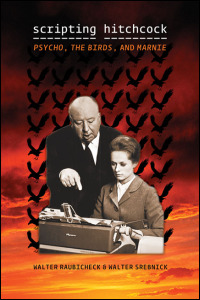 Following Scripting Hitchcock‘s nomination for an Edgar Award, authors Walter Raubicheck and Walter Srebnick discuss their interest in Psycho, The Birds, and Marnie, and reveal their favorite Hitchcock films.
Following Scripting Hitchcock‘s nomination for an Edgar Award, authors Walter Raubicheck and Walter Srebnick discuss their interest in Psycho, The Birds, and Marnie, and reveal their favorite Hitchcock films.
Q: Scripting Hitchcock focuses on three of Hitchcock’s later films. Why did you choose Psycho, The Birds, and Marnie for your analysis?
A: They were produced at the height of Hitchcock’s popularity, commercial success, and critical reputation and include his two best-known films—Psycho and The Birds—and the film that marks the end of his last great period as a filmmaker—Marnie. They were written by three young screenwriters, each of whom was new to Hollywood, and each of whom worked on the last of the three films: Marnie.
Q: Was Hitchcock’s general source material consistent throughout his directing career or did he draw from many different kinds of artistic and literary sources?
A: Like most of his films throughout his career, these three were based on popular contemporary literary works—two novels (Psycho, Marnie) and a novella (The Birds). He occasionally turned to plays (I Confess, Dial M for Murder), and once (The Wrong Man) to an actual true-life story.
Q: Psycho’s shower scene is one of the most famous in all of cinema. How did the dialogue or blocking change—if at all—from the screenplay to the screen?
A: The physical and visual construction of that scene was unprecedented in the history of film in its tight planning, sequencing, and intensity. Hitchcock worked it out in minute detail with his pictorial consultant, his crew, and his cast. But what happens in the scene was already quite evident in Joseph Stefano’s screenplay.
Q: Were any of the screenwriters initially skeptical about speaking with you for the book?
A: No. They were eager to talk with us, felt that our project was interesting and worthwhile, and seemed to see it as a way to be acknowledged for their contribution to these three classic films.
Q: Did Hitchcock have a different working relationship with female screenwriters than male screenwriters?
A: Actually of our three writers, he had the closest relationship with the one woman, Jay Presson Allen, who wrote Marnie. He felt she brought a woman’s point of view to a film which focused on a female protagonist. She and Hitchcock became fast friends and their relationship lasted until the end of his life.
Q: What was the most interesting thing that you learned in researching Scripting Hitchcock?
A: How important the screenwriter was in collaboration with Hitchcock, and how important the director was in the writing process. He was, in many ways, a co-writer. While they wrote all the dialogue and directions, and he subsequently directed the film, they worked closely together in shaping the narrative and characters at the heart of the film. He relied on them heavily and, considered them co-creators of the film, even when he was reluctant to admit it.
Q: Do you have a favorite Hitchcock film?
Walter Raubicheck: Rear Window, North by Northwest
Walter Srebnick: Vertigo, Psycho
